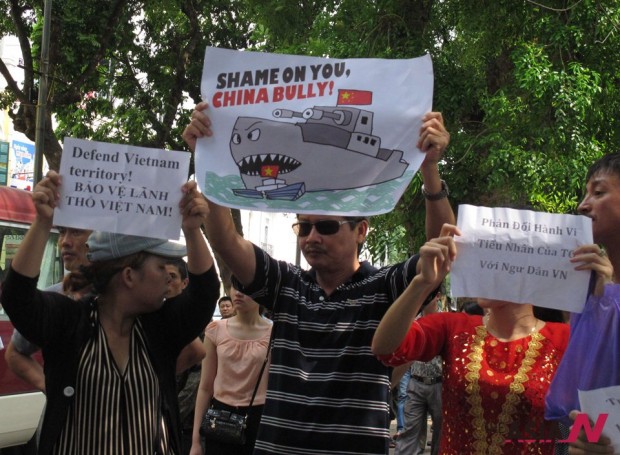Vietnamese protest against China’s territorial claims in South China Sea

ADDS CITY AND COUNTRY – Nationalist protestors hold up banners on Sunday, June 2, 2013 in Hanoi, Vietnam, demonstrating Chinese territorial assertiveness in the South China Sea. Police detained at least 15 people during the rally, which showed the domestic pressures facing the Hanoi government in its dealings with fellow Communist nation China. <AP Photo/Chris Brummitt>
Police detained about 15 anti-China protestors Sunday during a march in the Vietnamese capital that showed the domestic pressure the government faces when dealing with Beijing’s muscular approach to territorial claims in the South China Sea.
Scuffles broke out as police hauled ringleaders or especially vocal protesters into buses during the rally, a rare show of dissent in the tightly controlled one-party state.
Some members of the ruling Communist Party fear that popular anger over China, its ideological ally and biggest trading partner, could easily bleed into a broader protest movement against its rule. The party already faces growing calls for reform because of economic malaise, corruption and the free spread of information critical toward it over the Internet.
Sunday’s protest was advertised via Internet blogs and Facebook pages.
It took place in the heart of the city around the Hoan Kiem Lake, a popular Sunday morning spot for locals and foreign tourists to walk and sip coffee in cafes. “Down with the henchmen of China, down with the traitors,” one detainee shouted through the window of a government bus taking him away.
Authorities warned via loudspeakers that those marching should disperse, but also said the government was determined to defend its sovereignty against China. Uniformed and plain-clothes security officers outnumbered the approximately 150 protesters, which included men, women and children, some holding banners calling China a “bully.”
It was unclear whether those detained would be charged. Typically, people detained at protests like this are released after a few hours.

A Vietnamese police officer holds up his hand to obstruct the view of a photographer seeking to document the detention of protestors on Sunday, June 2, 2013, in Haoni. Police detained around 15 people during the protest in Hanoi against Chinese territorial assertiveness in the South China Sea. <AP Photo/Chris Brummitt>
“The government is not doing enough, it must do more (against China),” said Nguyen Quang A, a well-known economist who took part in the march.
Vietnam and China have long sparred over who owns the South China Sea, a dispute that the Philippines, Malaysia, Brunei and Taiwan are also parties to.
Over the last two years, America’s diplomatic tilt to Southeast Asia and energy-hungry China’s growing assertiveness in the waters has focused international attention on the issue.
Earlier this week, the Vietnamese government alleged a Chinese vessel had rammed into a Vietnamese fishing boat, damaging it. China said it had done nothing wrong. The deputies of the Communist party-controlled national assembly urged the government to take stronger action to defend the country’s sovereignty and protect its fishermen.
In Singapore on Sunday, Vietnam’s Deputy Minister of National Defense Col.-Gen. Nguyen Chi Vinh told a security conference that the region has not enjoyed stability and called for protection for fishermen and to “avoid the use of force against the fishermen by all means.”
In the summer of 2011, there were two months of weekly anti-Chinese protests in Hanoi, an unprecedented show of popular anger in the country.
In 2012, there also demonstrations against Beijing, which police dispersed, gradually using more force as it became clear they were becoming a source of domestic opposition to the party. <AP/NEWSis>
























































